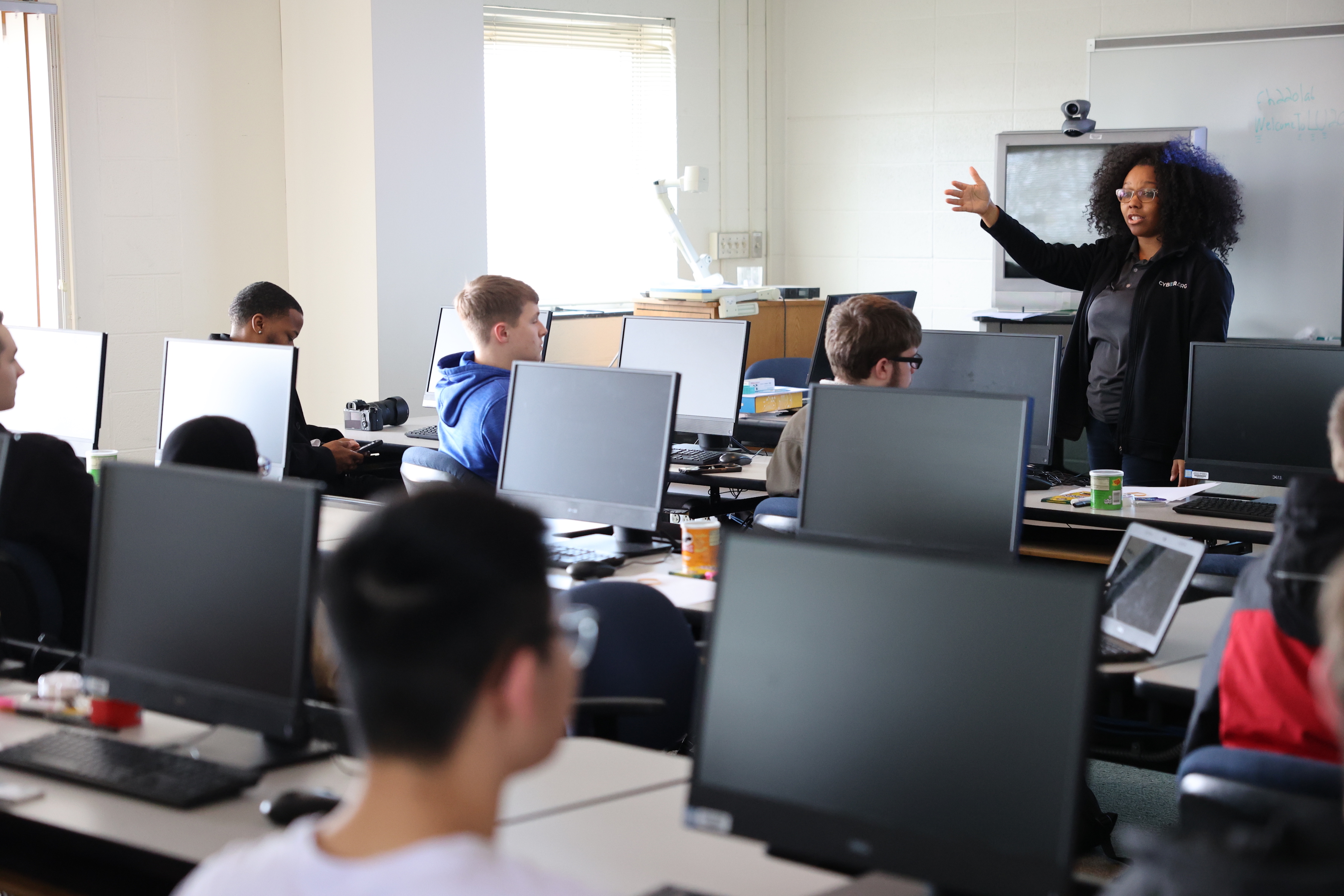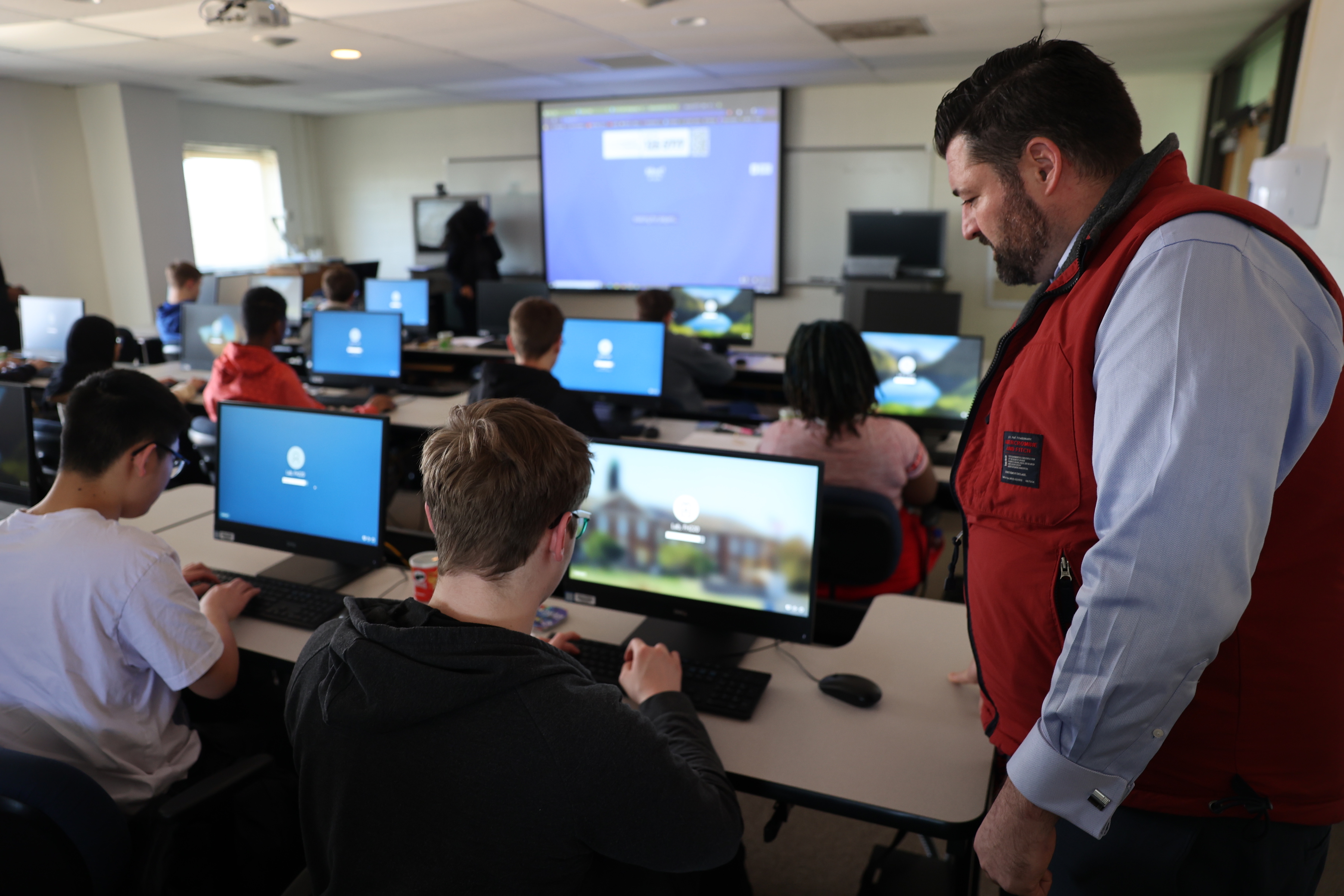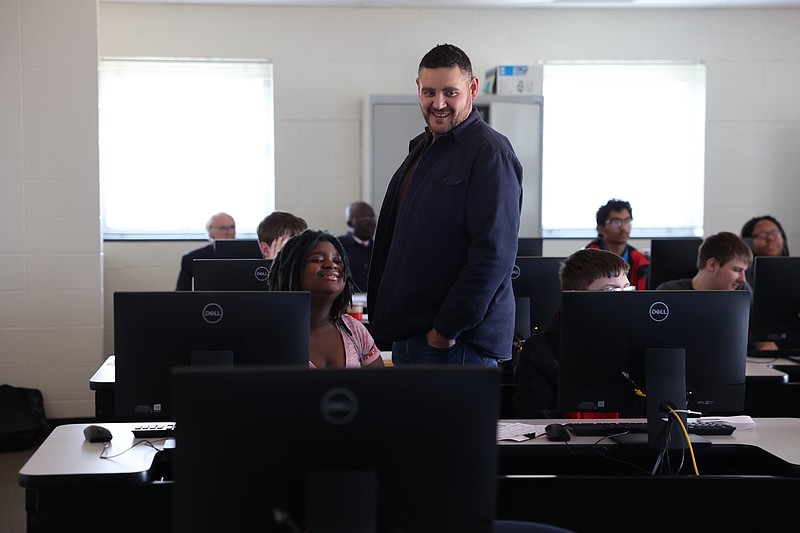Eighteen students from Jefferson City School District encrypted the message "I love pizza" using cipher disks Thursday.
Shortly after, they decrypted the phrase "Extra cheesy."
It was the first direct cybersecurity lesson from Cyber.org's Project Reach, a collaborative partnership between Cyber.org, Lincoln University and the two high schools within the Jefferson City School District.
Following an interactive game on cybersecurity careers, the class learned about encryption, how it can be used to protect data online and the basics of different encryption technology.
Encryption, generally, is the process of making understandable text incomprehensible to an untrained reader. The concept was demonstrated with pigpen ciphers, cipher disks and devices the students made from small Pringles cans.
Cyber.org is an academic initiative from the Cyber Innovation Center that is supported through grants from the federal Cybersecurity and Infrastructure Security Agency. Through Project Reach, it partnered with 10 historically Black colleges and universities to develop and distribute cyber, STEM and computer science curricula to K-12 schools across the country.
Corisma Akins, a Cyber.org education specialist and Project Reach lead, said Lincoln and JC Schools are the only institutions in Missouri engaged with the program.
Currently, it functions as an after-school club at the two high schools. Beginning next fall, the high schools plan to offer the curriculum through a semester-long course.
Chris Herriman is overseeing the program at Jefferson City; Jon Lindquist is overseeing it at Capital City
Lindquist, usually a business and finance teacher, said the partnership has been going well at Capital City.
He said the club has been primarily focused on simulations. Students act as hackers and create trojan viruses to gain backdoor access to a computer while also playing the victim trying to guard against the virus.
"Which is really fun because kids get to be kind of bad and then they get to be good," Lindquist said. "So we're doing it in a controlled environment where it's safe for them to do, which is really neat."
Lindquist said about 12-15 students are regularly attending the club after school. The semester-long course in development for next fall would be offered for grades 10-12.
The goal, Lindquist said, is for students to finish the course with a certification from the Computing Technology Industry Association. He anticipates it to be an intensive course for students.
"For the students, it's opening their eyes to opportunities they didn't know were available," Lindquist said. "And for me, too."
Lindquist said he used to teach digital video editing and other technology courses but didn't have cybersecurity on his radar.
"Even for Chris and I, it's kind of opening up a new window and showing us a world we didn't know existed," he said. "And I think the kids, that's why it's piquing their interest as well."
Akins said many people don't understand the amount of career opportunities in the cybersecurity field. Bringing that awareness to students, she said, can spark an interest and set them down a career path they may never have considered.
When announcing the Project Reach partnership last October, Akins described it as an HBCU feeder program created to diversify and bolster the country's cybersecurity workforce. She said there are more than 755,000 open positions in the national cybersecurity workforce and a steady uptick in cyber attacks, making it a growing career field.
The technology allowing students to practice their cyber skills, such as Chromebooks, virtual Windows machines and other engaging tools, are provided by Cyber.org. Lincoln's role is to provide administrative support, which is handled through its computer sciences program and faculty. The university hosted the encryption course Thursday, and Akins taught it.
Ryan Burns, communications director for JC Schools, said the district is excited about what it sees as a unique opportunity to partner with Lincoln University.
"Whenever they approached us with this partnership, we were all in because obviously it's a great opportunity for kids to get interested," she said. "But also with us being in the same community, basically in each other's backyards, it's just a no-brainer to look for ways that we can share resources and work together as partners."
Akins said the strong relationship between Lincoln and JC Schools has led to significant progress in a short amount of time.
Before the partnership, JC Schools didn't offer any computer science of cybersecurity courses. Akins said the addition of after-school clubs was one step forward. The advent of cybersecurity courses next year will be another.
"That's what we hope would happen with each one of our partners," she said.
Lindquist said he was "good nervous" about teaching the full course next school year.
"Nervous because we want to do a really good job but good because we're excited about it," he said. "We're looking forward to it."
The story has been updated to change the number of open positions in the national cybersecurity workforce.
 Courtesy/Brittany Ruess,JC Schools: Corisma Akins, a Cyber.org education specialist and Project Reach lead, teaches a course on encryption to a group of 18 high school students from the Jefferson City School District at Lincoln University. Project Reach is a partnership between Cyber.org, Lincoln and JC Schools that is bringing cybersecurity education to area high school students.
Courtesy/Brittany Ruess,JC Schools: Corisma Akins, a Cyber.org education specialist and Project Reach lead, teaches a course on encryption to a group of 18 high school students from the Jefferson City School District at Lincoln University. Project Reach is a partnership between Cyber.org, Lincoln and JC Schools that is bringing cybersecurity education to area high school students. Courtesy/Brittany Ruess,JC Schools: Jefferson City High School teacher Chris Herriman assists a couple students working on an encryption problem during a Cyber.org lesson at Lincoln University. Herriman will be one of two teachers in the Jefferson City School District to offer a cybersecurity course starting next school year.
Courtesy/Brittany Ruess,JC Schools: Jefferson City High School teacher Chris Herriman assists a couple students working on an encryption problem during a Cyber.org lesson at Lincoln University. Herriman will be one of two teachers in the Jefferson City School District to offer a cybersecurity course starting next school year.
